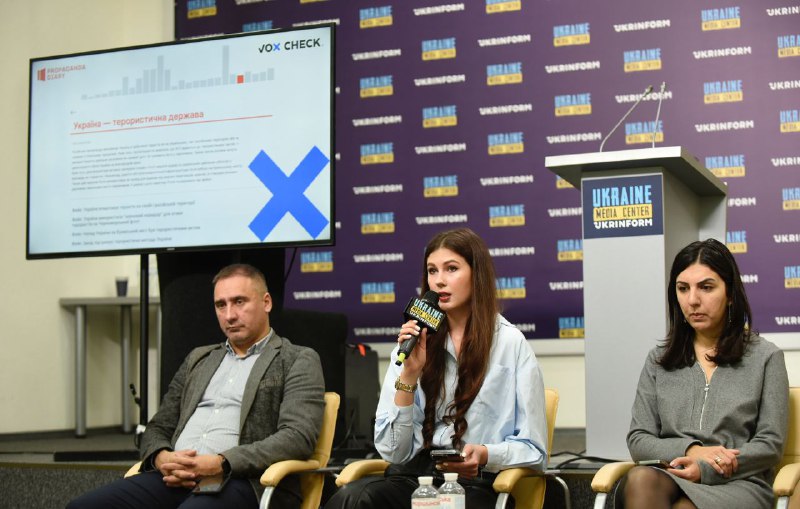
In 2023, the amount of propaganda in European news media almost doubled, with most fakes targeting Poland
From February to October 2023, the VoxCheck team recorded 8296 cases of Russian propaganda messages in the media of 6 European countries: Germany, Italy, Poland, the Czech Republic, Slovakia, and Hungary. Thus, more than 920 media publications containing Russian disinformation narratives are published in these countries’ media outlets every month.
Myroslava Markova, VoxCheck Senior Analyst made this report, during a discussion at the Media Center Ukraine – Ukrinform.
According to her, compared to 2022, in addition to the disinformation narratives about the Ukraine surge, there had been an increase in the number of flurry and fake news. Thus, fact-checkers recorded 43 new ones. The most spread messages are mostly related to the topic of the counteroffensive and discrediting the Ukrainian army, and falsehoods about alleged new terrorist acts in Ukraine have been an imposed narrative. And now the vast majority of countries are focusing on reports of Western weapons being transferred to Ukraine.
At the same time, the VoxCheck analyst noted, that Russia’s propaganda and disinformation activities are disseminated most of all on Polish media, this trend was observed with Poland ranked at the top both in 2022 and 2023, with 1858 disinformation cases recorded.
“First, this is a very large campaign of spreading messages aimed at discrediting or manipulating in order to smear Ukrainians. Currently, the top focus of this falsehood-based information is that Poles do not have enough resources to provide themselves with good social assistance, because everything goes to Ukrainians. In addition, there are traditional attempts to portray Ukrainian refugees as uncultured folk who somehow do not respect Poles or cause some kind of conflict, etc. The second point is that Poland has been giving and is giving a lot of aid to Ukraine, so the messages here are aimed at saying, as in many other countries, that Ukraine’s defeat is obvious and predictable, and all the resources you have spent are actually wasted, so you should not support it, you should not provide it,” explained Myroslava Markova.
At the same time, she said that in terms of the number of disinformation cases, Slovakia ranks second after Poland (1563), followed by the Czech Republic (1348 cases), Hungary (1373), Germany (1237), and Italy (916).
The analyst noted that, in general, three key narratives remain at the top today, which were identified back in 2022 and now continue to be layered, increased, and multiplied by a number of false reports.
First of all, it is the narrative that the West allegedly controls Ukraine and uses it for its own purposes. Thus, Myroslava Markova emphasized, that the topic of so-called peace talks is being actively shaped, where Russia allegedly makes numerous proposals, and Ukraine and the West strongly reject them only because they want to continue the war.
The second narrative is that the actions of Ukraine and the West forced Ukraine to start the war. It is also a very common story to justify a full-scale invasion and war crimes in Ukraine.
The third narrative is that supporting Ukraine is more harmful to the West than to Russia.
Another misinformation narrative in terms of the number of fakes goes for Ukrainian refugees, a discrediting campaign.
The VoxCheck analyst emphasizes that Russia’s propaganda machine takes the worst hit in countries where politicians themselves, such as Poland, Hungary, and Slovakia, directly or indirectly support Russian narratives.
“In Poland, this was evident in the last months before the election, in Slovakia during the election campaigns, and in Hungary, in fact, a person with pro-Russian views has been in power for years. As a result, even if we are talking about media outlets from the ‘white list’ or fairly high-quality media, more and more media in these countries will replicate Russian propaganda narratives, some messages, because they are simply voiced or want to quote their leaders, their politicians,” explained Myroslava Markova.
Read more: https://mediacenter.org.ua/news
 Back
Back 